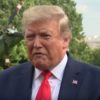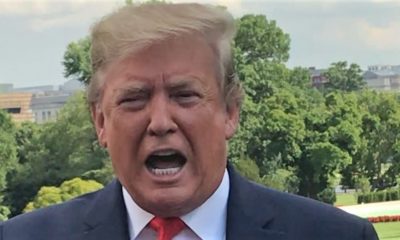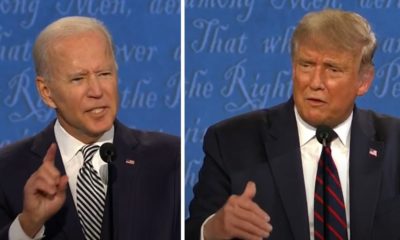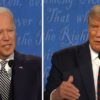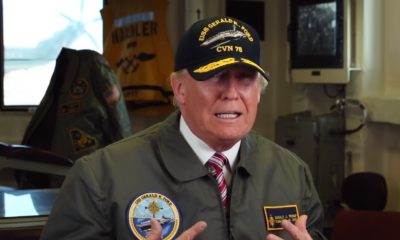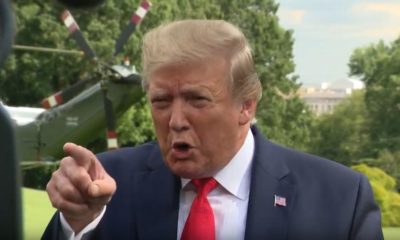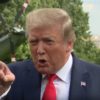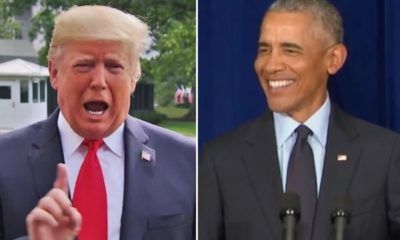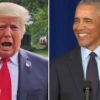Authoritarianism
Donald Trump Is A National Security Threat
Recently, Donald Trump launched 59 conspicuously ineffective missiles into a Syrian airbase, reportedly to threaten people-gasser Bashar al-Assad (though the Syrian government and the Russians disagree about Assad’s responsibility for the chemical attack, blaming Syrian rebels in an alleged false flag maneuver). International propaganda aside—and either way—the military forewarned the Russian military, and of course, the Russian military forewarned the Syrians. So why did we go through on the attack? In order to prevent an empty threat, Trump launched an empty assault?
And what is the follow-up strategy? The US has been utilizing special forces operations in Syria for years, but the Trump Administration has been quietly adding marines on the ground, and last month the military outlined the deployment of up to one thousand more troops. Is another American occupation of a Middle Eastern country creeping up?
The most demoralizing part of this has been the media’s positive reaction to President Trump firing the missiles into Syria and dropping the Mother of All Bombs on Afghanistan, alleging that Trump’s haphazard “what does this button do?” experiments have suddenly made him presidential. The august power of the US military should not alone grant a president our patriotic fealty or distract from our civic right to know what is being done across the world in our name as American citizens.
President Obama was guilty of shadow war as well, so don’t mistake this as a double standard, but through the cold, objective lens of rationalism, Obama earned a base level of trust that Trump has not. Examine the deliberate actions of the two presidents, independent of political spin. Obama, whose red line had been crossed by Assad’s first chemical gassing of his people, wanted to both intervene in the Syrian Civil War and follow Constitutional protocol by asking Congress for authorization to bomb the Syrian government with a formal declaration of war against ISIS, but the Republican Congressional majorities refused to vote or attach their name to a potentially unpopular war (to stave off any potential political stigma, such as the stigma that has followed many Democratic presidential candidates who supported the Iraq War).
Obama also pulled the US out of two catch-22 occupations. Is Trump inching toward a new one? Let’s talk about the fact that President Trump randomly fired 59 missiles into a country we are not at war with. That’s illegal in many ways, and regardless of which-party-does-it-worse, perhaps definitively, it is time for Americans to be told what exactly our country is doing overseas and why. It is time for the US people to start monitoring how our democracy intervenes in other self-sovereign nations. Because for decades our society has oddly agreed that it is best if we simply don’t know the dark things our government does, which obscures the reason for any blowback consequences that follow them.
The Republican Party, no doubt, will not formally consent to any official Trumpian War, but rather continue the Congressional tradition of yielding militancy—and the responsibility for its consequences—to the Presidency. It’s not very legislative of Congress to be unwilling to sign their names to our military’s exertions, especially since the Constitution literally says they have to as an integral check on the executive branch for federal balance. The Congressional power to declare war was designed as a safeguard against tyranny, and our members of Congress have willingly abandoned their Constitutional authority because war schemes might come back to hurt their reelection campaigns if things don’t pan out like the warmongers promise. Again, Trump illegally bombed a nation the US is not at war with, and the Republican Congress isn’t concerned.
Defensively, our nation was objectively the victim of Russian electoral subterfuge, yet the Republican majorities in Congress are putting party ahead of country in dragging their feet investigating because the conclusions of such a study might call into question the legitimacy of their election victory… ¯\_(ツ)_/¯
As a presidential candidate, Trump responded to rumors of his omnipresent Russiagate scandal by suggesting that America would be better off in a friendlier relationship with Vladimir Putin, but it appears as if the US military has not entertained the same optimism. The Kremlin has similarly suggested that relations between the US and Russia are at their worst since the Cold War.
Fittingly, the press has been fed an unending drip, drip, drip of Russiagate details, and the nation cannot help but suffer a surrealist anxiety in the back of it’s head that Trump may only have months left as president if the FBI arrests him for treason. The latest revelation in the investigation is that European intelligence partners have been sharing evidence of the Trump campaign’s Russian dealings with the US since last summer. In Washington D.C., Representative Devin Nunes’ late night White House briefing debacle defending Trump’s apparently made up claim that the Obama Administration wiretapped him personally did not help the White House obscure the ubiquitous scandal.
The Trump team’s denials aside, Russia definitively harassed our nation with fake news online specifically designed to target potential swing voters in order to benefit Trump’s election, and even if the Russian government has since lost interest in feeding Donald Trump’s ego, it is still abundantly clear that Russia went to great lengths to help defeat Hillary Clinton—whose presidency promised to share the Obama Administration’s disdain for Russian intentions on the world stage. The Russian oligarchs’ chance to lift economic sanctions depended on Trump, and he even did Russia a further favor by wondering aloud if NATO mattered at all—and consequently alarming America’s decades-long blood brother allies in Europe. Fortunately, it appears as if military advisers in the Trump Administration have persuaded him that a weakened or disbanded NATO is not in the interest of US foreign policy, and have mitigated a few of the more absurd ideas of Trump’s Know-Nothing campaign—Trump has similarly been talked out of fulfilling his campaign to label China a currency manipulator, presumably because, bravado notwithstanding, China is actually a valuable trading partner.
Meanwhile, an unhinged North Korea could be compelled to fire nuclear missiles at South Korea or Los Angeles, it seems, any day now. The Trump Administration is staring down North Korea’s recent bellicosity—in the case of Vice President Mike Pence, literally—from behind a rhetorical cold shoulder with public statements such as “the era of strategic patience is over.”
That sounds tough and macho, yes, but it also sounds like the US is momentarily going to bomb North Korea. Is Pence certain that Kim Jung Un has a capable English translator? The alpha-male schtick is obvious, but what if North Korea preemptively bombs their southern neighbor ahead of what would appear to be an imminent preemptive American strike? If millions of South Koreans die because of neoconservative machismo, could Pence’s end-of-patience remark be evaluated as anything other than an unforgivable bluff?
And if war breaks out, I have no doubt—as any patriotic American—about the US military’s capability of ending North Korean civilization. But what about after? The quagmire of an occupation in North Korea and a rehabilitation of its brainwashed and impoverished people could make Iraq look like a walk in the park. Herein lies the responsibility of an epic arsenal of military power: we can kill millions of people, but it’s pretty sociopathic of us to feel the need to prove it. And don’t forget that in between these nemesis nations stand guard 28,500 US citizens…
Can we all agree that a military maneuver that collaterally gambles the lives of almost 30,000 American soldiers, and who knows how many Koreans, must be signed off on by our elected legislators, who must be so confident that war is necessary that they are effectively putting their careers on the line for that specific vote? Our country was intentionally not designed for one person, the president, to bear sole responsibility for our nation’s endless warring. Giving such power to one person is wildly destructive to America’s national security, and perhaps the time is ripe for our legislative branch to be forced to perform its constitutional duty to its constituent citizenry and hold in check our chief executive’s conspicuous temperamental deficiencies.
Beyond the office of the presidency and the Congress, America at large is turning into an international pariah state before our eyes, exchanging the nation’s awesome soft power influence for the compensational hard power of unnecessary saber rattling. It’s like forceful neo-imperialist impotence.
The most curious aspect of the Korean peninsula’s current crisis is China’s mediator role. China is simultaneously the nation most capable of calming down North Korea’s belligerence, and the nation least interested in an American occupation of North Korea—which shares a long land border with China—so, if nuclear war is avoided, the Chinese will be the heroes of the story. The Trump Administration, in contrast, claimed to sail a carrier strike force toward North Korea and suggested that the time for talking was over. The most mixed-message part of the whole confrontation was that the advancing carrier group was actually en route in the opposite direction toward Australia. Did Trump intentionally lie, or did he just not know what he was talking about? Which is worse?
I don’t want to debate “Whose century is it?” but I think a defining moment of this decade in the history of global politics very well may be that China brokers a deal that stops the United States from nuking another country. In his campaign, Trump infamously asked why the US has nuclear weapons but doesn’t use them. Let’s hope that his military advisers can explain to him why the US doesn’t nuke other countries. Yet if China negotiates the preservation of the Korean armistice to stave off unstable American escalation, is the US really an indispensable nation anymore?
In the rest of the Asian region, foreign-political circumstances are dramatically turning away from the United States’ long-term geopolitical interests. Say what you will about the Trans-Pacific Partnership’s potential effect on the declining American manufacturing industry, but the Obama Administration designed the international agreement to economically bond the major Pacific Ocean economies to America’s economy, at the direct expense of a conspicuously boxed-in China. Since the TPP deal has collapsed, and Trump’s Alt-Right penchant for vocalizing nationalistic selfishness has percolated throughout the world, Asian nations are, naturally, beginning to pony up with China. The Philippines’ President Rodrigo Duterte was particularly dramatic in his ideological breakup with the US, alleging that “America has lost” before promising a political and economic shift toward China.
Authority for the rest of the century will depend on the soft power of economic and political loyalty, and the Trump Administration is not doing the United States a favor by proving to the rest of Asia that the US is less interested in stability than China. If the US precipitates war with a machismo Trumpian bluff that Kim Jong Un will back down first, and the Koreas are crippled, we as Americans should come to terms with the pariah nation status we apparently voted for. Though in his defense, it’s not like Trump didn’t campaign for nuclear proliferation and a rejection of the Obama Administration’s doctrine of consensus and coalition-building.
Despite the Alt-Right’s insistence that Trump is brilliantly playing cutthroat Risk! on a twelve-dimensional chessboard, it’s a conspicuously bungled mess pragmatically. With Trump and/or the military posturing so aggressively toward such disparate characters of the world—Syria, ISIS, Russia, China, Iran, North Korea, and a classified number of terror cells in various other nations around the world—our national security is compromised simply due to the number of nations in which we are kinetically intervening or anticipating the need to intervene. If any single powder keg were to blow, the United States could be caught flat-footed in the others. What if North Korea starts bombing South Korea at the same time that Assad resumes chemically gassing his battered people, and that Iran resumes building nuclear weapons, and that ISIS pulls off a terror attack in New York City, and that a terror group in Yemen kidnaps American citizens as blowback from our Saudi arms support, and that Russia annexes the rest of Ukraine and mobilizes on Estonia’s border, and that China begins construction on new manufactured Pacific islands? How many rabbit holes can the US chase down at once?
This is why nationalistic machismo is an American security threat, and even worse, it has no pretense of ideological consistency or practicality. Donald Trump’s blunt, narcissistic insistence that with unilateral bluster he can will himself into political magnificence will fail spectacularly like his various bankrupt, luxury-line businesses. Yet too many lives and years of liberal democracy are at risk to enable Trump’s alpha-male delusions of grandeur.
Donald Trump is an abrasive national security threat.



